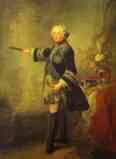Olga's Gallery
In the past two weeks we have published the collections of several artists:
Angelica Kauffmann, Anton
Mengs, and Antoine Pesne. Antoine
Pesne, a French expatriate, was a court painter of the Prussian King Frederick
II the Great, whose life we're going to describe today.
Frederick II the Great
 Frederick
II, the Great (1712-86), king of Prussia (1740-1786), remains one of the
most famous German rulers of all time for his military successes and his
domestic reforms that made Prussia one of the leading European nations.
Frederick
II, the Great (1712-86), king of Prussia (1740-1786), remains one of the
most famous German rulers of all time for his military successes and his
domestic reforms that made Prussia one of the leading European nations.
He was born in Berlin, the first son of Frederick William I, and Sophia-Dorothea, daughter of George I of Great Britain. His early years were spent in military training under a rigid system of education, against which he rebelled fiercely but in vain. At 18 he even made an attempt to escape to the court of Great Britain. His father interpreted this action as treason. The young prince would have been punished by death, and only the intervention of the emperor saved his life. This did not apply, however, to his assistants. His confidant, Lieutenant Katte, was beheaded before the prince's eyes.
 After
his close brush with death, Frederick realized that submission was his
only option, and, although he hated his father all his life, he never openly
revealed it. After a time Frederick William entrusted Frederick with some
military and civil duties, which the latter fulfilled, hiding his contempt,
eagerly and perfectly. In 1733, Frederick II dutifully married Princess
Elizabeth of Brunswick-Wolfenbüttel (1715-97), chosen for him by his
father. Artistically gifted Frederick II devoted his leisure to the study
of music, painting and French literature, for which he had a keen and lasting
admiration. He was greatly skilled on the flute, having achieved an almost
professional level. He was a correspondent of Voltaire's (who visited Berlin
in 1750), and he studied philosophy.
After
his close brush with death, Frederick realized that submission was his
only option, and, although he hated his father all his life, he never openly
revealed it. After a time Frederick William entrusted Frederick with some
military and civil duties, which the latter fulfilled, hiding his contempt,
eagerly and perfectly. In 1733, Frederick II dutifully married Princess
Elizabeth of Brunswick-Wolfenbüttel (1715-97), chosen for him by his
father. Artistically gifted Frederick II devoted his leisure to the study
of music, painting and French literature, for which he had a keen and lasting
admiration. He was greatly skilled on the flute, having achieved an almost
professional level. He was a correspondent of Voltaire's (who visited Berlin
in 1750), and he studied philosophy.
On 31 May 1740, Frederick became the king, and already in December he, using an antiquated claim to Silesia for an excuse, invaded the province, defeated the Austrians at Mollwitz (1741) and Chotusitz (1742), and forced Maria Theresa to give him Upper and Lower Silesia by the Treaty of Breslau (1742).
As a result of the Second Silesian War (1744-45) Frederick accumulated even more territories and acquired the reputation of one of the best military commanders of the period. During the Seven Years War (1756-63), Frederick successfully resisted opposition from France, Russia, and Austria despite his smaller means. It was his military genius that saved his country and brought Prussia out of the war stronger than it had been before it. His personal courage, military genius, and resourcefulness in victory and defeat entitled him ‘the Great’.
In 1772, Frederick II participated in the first partition of Poland, acquiring Polish Prussia and a portion of Great Poland. One of his last political actions was the formation of the ‘Fürstenbund’, which was the first appearance of Prussia as a rival to Austria for leadership of the German states. Frederick was an able administrator, and contrived to carry on his wars without incurring a penny of debt. He regarded himself as the first servant of the state; he was his own prime minister in a very literal sense.
Frederick was essentially a just, and somewhat austere man. He was an
absolute ruler, but he did not rule by his own personal whims, always keeping
Prussia's welfare in mind, and he expected his people to possess the same
devotion.
As the king, Frederick established universal religious tolerance and
granted freedom of the press. The administration of justice under his rule
was pure. Prussian judges were educated and the courts gained a reputation
as the most honest in Europe. He established the first German code of laws
and enforced general education rules across Prussia. Frederick built Prussia
into one of the strongest nations in Europe and left a legacy of absolute
devotion to the fatherland that continued to shape German history into
the 20th century.